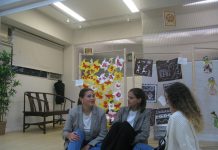Connie Wat, the adoption services supervisor of Mother’s Choice, says that there have been cases of failed adoptions in the past in which adoptive families gave up the adopted children after taking them home. “But usually it is due to personal reasons such as violence and health problems,” she says, “very rarely do they give up because of ethnicity.”
Wat explains it is preferable for adoptive families to have the same ethnic background as the children because in reality, interracially adopted children are very likely to encounter judgmental stares from strangers and questions from their classmates.
“We encourage parents to tell their adopted children the truth [about their adoption] as early as possible,” she says, “but for interracial adoption, the children may still have to face problems such as confusion over their own identity.”
Wind Au Fung-han, a social worker at the ISSHK, says there is plenty of room for improvement in terms of society’s openness towards adoption in Hong Kong, especially towards interracial adoptions. She says adoption is a lot more common in the United States, where “rainbow” families can be easily found.
Maggie Cheung grew up in an unusual mixed family in Hong Kong. Cheung, whose birth mother was Pakistani, was raised by a local Chinese family. She is culturally, linguistically and by family background, a local Chinese Hong Konger. Yet she has always been marked out.
Cheung learnt about her own story at a very young age because her mother always had to repeatedly explain to everyone who asked. Her father was even asked by his relatives that why he adopted an “ah-cha” (a derogatory term for South Asian), directly in front of the young Maggie. “But I could easily accept the truth when I was told as a kid,” she says, “I have become more resistant as I’ve got older.”
Cheung was born in the Tai Lam Correctional Institution where her biological mother was jailed for transnational drug trafficking. She was raised by her foster parents, who eventually became her adoptive parents when she was three years old. That was when her her birth mother went back to Pakistan. She has never received any contact from her since.
Despite all the questions, the young Maggie regarded herself as a complete Hong Konger until she entered primary school, where she faced strange looks and endless questions from her schoolmates. In order to protect herself, she became a bully in school. “I used foul language and bullied others,” she says.
Things changed when she was in year two of secondary school. It was 2001 and after the terrorist attack on the US on September 11, she became the centre of attention. “My classmates gossiped about me and said, ‘Hey, she’s the daughter of Bin Laden’,” she says of her most difficult time in school. The upside was this meant she received a lot of help and support from her teachers. “I was so touched as I got people to care about me, finally,” she says.
Cheung says she never excelled academically, but she pushed herself hard, passing her A-level exams and getting into university. She is a graduate of the Chinese University of Hong Kong and now teaches liberal studies at her old secondary school.
“Deep down I acknowledge that it’s the government of Hong Kong that adopted me,” she says, “and that’s why I feel like working harder in order to contribute to society.”






































